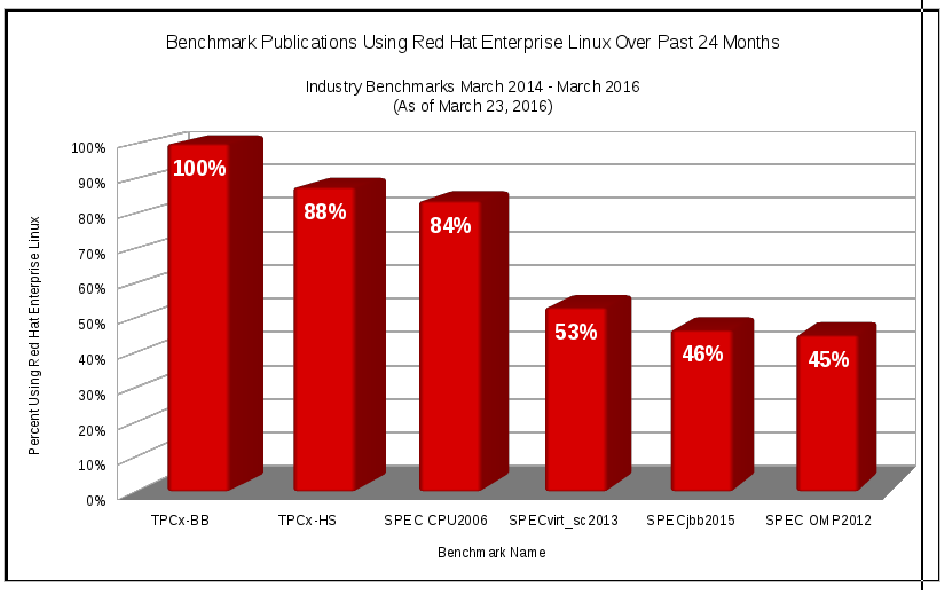Yesterday, Intel launched the Xeon E5-2600 v4 processor family with 26 new world records on industry-standard benchmarks. Once again, Intel’s innovation, driven by Moore’s law, has enabled faster computing for the enterprise world.
Red Hat and Intel have enjoyed a long history of collaboration across a full spectrum of enterprise IT - covering a wide range of use cases, from applications running on physical servers to virtualized and cloud-based deployments. It should come as no surprise that many of
these benchmark results were announced with Red Hat Enterprise Linux serving as the underlying platform (see table below).
| Significance | OEM Platform | Benchmark | OS |
| 2-socket world record (tie) | Cisco UCS C220 M4 | General Server Throughput Computing: SPECint_rate_base2006 | Red Hat Enterprise Linux 7 |
| 2-socket world record (tie) | Fujitsu PRIMERGY RX2540 M2 | General Server Throughput Computing: SPECint_rate_base2006 | Red Hat Enterprise Linux 7 |
| 2-socket world record (tie) | Huawei RH2288H v3 | General Server Throughput Computing: SPECint_rate_base2006 | Red Hat Enterprise Linux 7 |
| 2-socket world record | Cisco UCS C220 M4 | General Server Speed Computing: SPECint_base2006 | Red Hat Enterprise Linux 7 |
| 2-socket world record (tie) | Cisco UCS C220 M4 | Technical Speed Computing: SPECfp_base2006 | Red Hat Enterprise Linux 7 |
| 2-socket world record | Cisco UCS B200 M4 Blade Server | Technical Computing: SPECompG_base2012 | Red Hat Enterprise Linux 6 |
| 2-socket world record | Cisco UCS C220 M4 | Server-side Java: SPECjbb*2015 Multi-JVM Critical-jOPS | Red Hat Enterprise Linux 7 |
| 2-socket world record (Linux) | Dell PowerEdge R730 | Business Processing - Enterprise Resource Planning (ERP): Two-tier SAP Sales and Distribution | Red Hat Enterprise Linux 7 |
| World record | HPE ProLiant DL380 Gen9 | Big Data Analytics: TPC Benchmark Express Big Bench @ 3000 | Red Hat Enterprise Linux 6 |
| World record | HPE ProLiant DL380 Gen9 | Server-side Java: SPECjbb2015 Distributed Max-jOPS | Red Hat Enterprise Linux 7 |
| World record | HPE ProLiant DL360 Gen9 | Server-side Java: SPECjbb2015 Distributed Critical-jOPS | Red Hat Enterprise Linux 7 |
| World record | HPE ProLiant ML350 Gen9 | Server-side Java: SPECjbb2015 Composite Max-jOPS | Red Hat Enterprise Linux 7 |
| World record | HPE ProLiant DL360 Gen9 | Server-side Java: SPECjbb2015 Composite Critical-jOPS | Red Hat Enterprise Linux 7 |
| 2-socket x86 world record | HPE ProLiant DL360 Gen9 | Server-side Java: SPECjbb2015 Multi-JVM Max-jOPS | Red Hat Enterprise Linux 7 |
| 2-socket x86 world record | Lenovo System x3650 M5 | Infrastructure/Virtualization: SPECvirt_sc2013 | Red Hat Enterprise Linux 7 |
| World record | Lenovo System x3650 M5 | Infrastructure/Virtualization: SPECvirt_sc2013 PPW (Server and Storage Performance per Watt) | Red Hat Enterprise Linux 7 |
| World record | Lenovo System x3650 M5 | Infrastructure/Virtualization: SPECvirt_sc2013 ServerPPW (Server Performance per Watt) | Red Hat Enterprise Linux 7 |
Source: http://www.intel.com/content/www/us/en/benchmarks/server/xeon-e5-v4/xeon-e5-v4-world-record.html
With 17 world record results on the Intel Xeon E5-2600 v4 processor family, Red Hat Enterprise Linux was a platform of choice for several Original Equipment Manufacturers (OEMs), just as it was for the Intel Xeon E5-2600 v2 and Xeon E5-2600 v3 families of processors at their respective launches.
For our customers, these results position Red Hat Enterprise Linux as an excellent choice for demanding enterprise workloads running across, physical, virtual or cloud deployments, thanks in no small part to Red Hat Enterprise Linux’s system performance and support for many of the latest enterprise computing features. These results demonstrate that Red Hat Enterprise Linux runs workloads more efficiently with fewer systems while achieving better results as compared to the competition.
We would like to congratulate our OEM partners that have selected the world’s leading enterprise Linux platform to deliver these top performance results on new hardware. These outstanding results underscore the importance of collaboration across the entire technology ecosystem, as many of these records are the culmination of combined silicon, hardware and software improvements.
We are very pleased to see a continued dedication to Red Hat Enterprise Linux as an open source platform for handling the rigors of these very demanding benchmarks. Compared to other operating systems used to produce record-setting results, Red Hat Enterprise Linux was used in one half of all publications. Out of 34 benchmark results results posted by 9 different OEM partners, Red Hat Enterprise Linux was used in 17, surpassing both SuSE and Microsoft.
Moreover, the industry adoption of Red Hat Enterprise Linux for running and publishing standard benchmarks, such as those from SPEC and TPC, continues to grow.
As the chart (above) demonstrates, Red Hat Enterprise Linux was predominantly used in TPC and SPEC benchmark publications during the last two years*. These benchmarks cover a broad spectrum of workloads ranging from compute-intensive technical computing problems to Big Data analytics and from enterprise Java applications to virtualization.
Enterprises and customers place increasing demands on their infrastructure and, with today’s results and those before it, Red Hat’s flagship platform continues to distinguish itself by showing industry-leading capabilities and excellent performance regardless of workload type and deployment environment, effectively expanding the boundaries of traditional IT.
All results as of March 31, 2016. SPEC and the benchmark names SPEC CPU, SPECjbb, SPEComp and SPECvirt_sc are registered trademarks of the Standard Performance Evaluation Corporation. For more information about SPEC and its benchmarks see: www.spec.org. TPC is a trademark of the Transaction Processing Performance Council (TPC). For more information about the TPC and it's benchmarks see www.tpc.org. SAP and SAP NetWeaver are the registered trademarks of SAP AG in Germany and in several other countries. See www.sap.com/benchmark for more information.
* Results as of March 23, 2016. Based on the data collected for two calendar years (from 03/2014 to 03/2016) using the following public resources: http://www.spec.org and http://www.tpc.org/
Sobre o autor
Yan Fisher is a Global evangelist at Red Hat where he extends his expertise in enterprise computing to emerging areas that Red Hat is exploring.
Fisher has a deep background in systems design and architecture. He has spent the past 20 years of his career working in the computer and telecommunication industries where he tackled as diverse areas as sales and operations to systems performance and benchmarking.
Having an eye for innovative approaches, Fisher is closely tracking partners' emerging technology strategies as well as customer perspectives on several nascent topics such as performance-sensitive workloads and accelerators, hardware innovation and alternative architectures, and, exascale and edge computing.
Navegue por canal
Automação
Saiba o que há de mais recente nas plataformas de automação incluindo tecnologia, equipes e ambientes
Inteligência artificial
Descubra as atualizações nas plataformas que proporcionam aos clientes executar suas cargas de trabalho de IA em qualquer ambiente
Serviços de nuvem
Aprenda mais sobre nosso portfólio de serviços gerenciados em nuvem
Segurança
Veja as últimas novidades sobre como reduzimos riscos em ambientes e tecnologias
Edge computing
Saiba quais são as atualizações nas plataformas que simplificam as operações na borda
Infraestrutura
Saiba o que há de mais recente na plataforma Linux empresarial líder mundial
Aplicações
Conheça nossas soluções desenvolvidas para ajudar você a superar os desafios mais complexos de aplicações
Programas originais
Veja as histórias divertidas de criadores e líderes em tecnologia empresarial
Produtos
- Red Hat Enterprise Linux
- Red Hat OpenShift
- Red Hat Ansible Automation Platform
- Red Hat Cloud Services
- Veja todos os produtos
Ferramentas
- Treinamento e certificação
- Minha conta
- Recursos para desenvolvedores
- Suporte ao cliente
- Calculadora de valor Red Hat
- Red Hat Ecosystem Catalog
- Encontre um parceiro
Experimente, compre, venda
Comunicação
- Contate o setor de vendas
- Fale com o Atendimento ao Cliente
- Contate o setor de treinamento
- Redes sociais
Sobre a Red Hat
A Red Hat é a líder mundial em soluções empresariais open source como Linux, nuvem, containers e Kubernetes. Fornecemos soluções robustas que facilitam o trabalho em diversas plataformas e ambientes, do datacenter principal até a borda da rede.
Selecione um idioma
Red Hat legal and privacy links
- Sobre a Red Hat
- Oportunidades de emprego
- Eventos
- Escritórios
- Fale com a Red Hat
- Blog da Red Hat
- Diversidade, equidade e inclusão
- Cool Stuff Store
- Red Hat Summit



